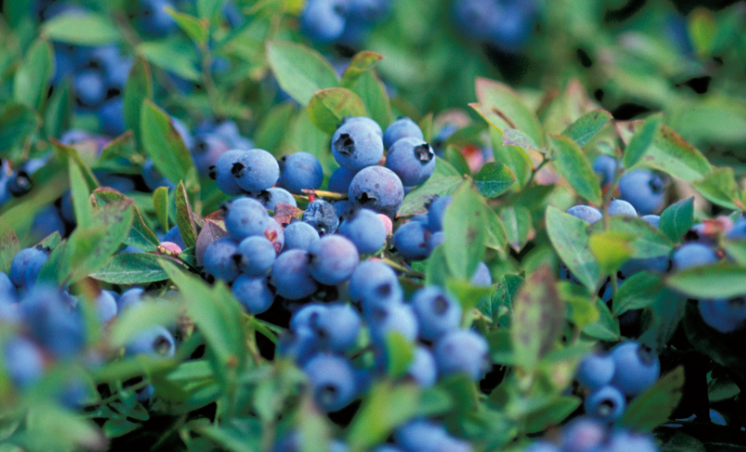Heart Health and Blueberries
With cardiovascular diseases continuing to be a leading cause of mortality worldwide, doing what you can to keep your heart healthy is understandably important. Thankfully, nature provides us with an abundance of foods that can contribute to a healthier heart. One such food is the blueberry.
These small, juicy berries are not only delicious but also packed with essential nutrients that support heart health.
Blueberries: A Nutritional Powerhouse
Blueberries, whether highbush or wild, are known for their impressive nutritional profile. Rich in vitamins, minerals, antioxidants, and dietary fiber, blueberries are a standout choice for promoting heart health. Take a look at some of the ways blueberries can help keep your heart healthy.
Blueberries are Antioxidant and Anti-inflammatory
Research has shown that the wide range of natural antioxidants found in fruits and veggies help protect against life-threatening diseases, including heart disease. Blueberries—especially wild blueberries—contain a variety of nutrients, including anthocyanins, a flavonoid with potent antioxidant capacity.
Anthocyanins are the plant compounds found in the skin of blueberries that give them their purply blue hue. A growing body of research suggests anthocyanins work to reduce inflammation and are beneficial to humans. When it comes to anthocyanins, wild blueberries pack a bigger punch, containing 33% more anthocyanins than high bush blueberries.
Inflammation is found in a variety of chronic diseases and conditions, including heart disease. The anthocyanins found in blueberries (and especially in wild blueberries) are proven to have anti-inflammatory capacities, making them an important component of an anti-inflammatory diet.
Blueberries Contain No Added Sugar
Blueberries are a glycemic-friendly food, with no added sugars and delicious taste to boot. With a low glycemic index (GI) score of 53 on the 100-point scale, blueberries weigh in alongside other low GI foods, such as non-starchy vegetables, fruits, beans, and most dairy products.
Improved Cardiovascular Function
Foods can help maintain the cardiovascular system (basically how blood travels through the body). Some foods that are high in antioxidant activity like blueberries can support blood flow by helping to keep blood vessels healthy. With healthy blood flow, the brain can get the oxygen and energy it needs to work at its best. And it’s been shown that good cerebral blood flow can support a healthy brain, and in turn, a healthy heart.
Highbush vs Wild Blueberries Nutritional Profiles
There are some differences in the nutritional profiles of highbush and wild blueberries, and it’s worth taking a look.
Highbush or cultivated blueberries (Vaccinium corymbosum) are the more common and commercially cultivated variety. They’re larger than their wild counterparts, with a slightly sweeter taste. Wild blueberries (Vaccinium angustifolium) are smaller and have a more intense, tangy flavor compared to highbush blueberries.
When it comes to heart health, here’s how highbush and wild blueberries compare:
Anthocyanins
Anthocyanins are the plant compounds found in the skin of blueberries that give them their pretty purply blue hue. A growing body of research suggests anthocyanins work to reduce inflammation and have been associated with cardiovascular benefits. Wild blueberries have 33% more anthocyanins than highbush blueberries. That means they offer more concentrated heart-protective benefits.
Antioxidants
Antioxidants help reduce oxidative stress and inflammation, which are factors that can lead to the development of heart diseases. including cranberries, strawberries, plums, raspberries, and even cultivated blueberries. In fact, wild blueberries have 2x the antioxidant power of highbush blueberries.
Incorporating Blueberries into Your Diet for Heart Health
Regardless of whether you choose highbush or wild blueberries, both can contribute to a healthier heart when incorporated into a balanced diet. Looking for ways to incorporate blueberries into your diet? Here are some practical tips for enjoying blueberries:
Fresh or Frozen: Both fresh and frozen blueberries retain their nutritional value, so choose whichever is more convenient for you. Frozen blueberries can be used in smoothies, yogurt, or oatmeal.
Snacking: Enjoy a handful of blueberries as a snack between meals. They are a satisfying and heart-healthy alternative to processed snacks.
Breakfast: Add blueberries to your morning cereal, pancakes, or oatmeal for a burst of flavor and nutrition.
Smoothies: Blend blueberries with other heart-healthy ingredients like spinach, kale, Greek yogurt, and a touch of honey for a nutritious and delicious smoothie.
Baking: Incorporate blueberries into your baking endeavors by making blueberry muffins, scones, or even blueberry-infused sauces for savory dishes.
Salads: Sprinkle blueberries on salads to add a pop of color, flavor, and nutrition. They pair well with leafy greens, nuts, and a light vinaigrette.
And if you’re looking for more inspiration, check out our recipe section.
The Bottom Line
Blueberries are nutrient-rich and offer a wide range of benefits, including antioxidant protection, cholesterol regulation, and inflammation reduction. Wild blueberries are especially powerful, containing 33% more anthocyanins and 2x the antioxidant power of highbush blueberries. Making blueberries a regular part of a balanced diet, engaging in regular physical activity, managing stress, and avoiding smoking is an excellent strategy for promoting heart health.
More about Wild Blueberries
Compared with ordinary highbush blueberries, wild blueberries boast an intense blueberry taste, ranging from tangy tartness to succulent sweetness. Wild blueberries are flash frozen immediately after harvesting, so they always taste great. And because they’re loaded with 33% more anthocyanins than ordinary blueberries, wild blueberries contribute to healthy brains. Their smaller size means twice the berries—and twice the antioxidants—in every bite.
About the Wild Blueberry Association of North America
The Wild Blueberry Association of North America (WBANA) is a trade association of farmers and processors of wild blueberries from Maine who are dedicated to bringing the wild blueberry health story and advantages to consumers and the trade worldwide. WBANA is dedicated to furthering research that explores the health potential of Wild Blueberries. To date, hundreds of studies have been conducted on the potential health and disease fighting benefits of Wild Blueberries.

